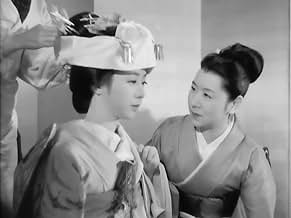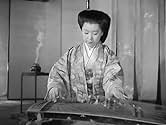अपनी भाषा में प्लॉट जोड़ेंShinnosuke is introduced to Shizu as a prospective wife, but he falls in love with her widowed sister Oyu. Convention forbids Oyu to marry because she has to raise her son as the head of her... सभी पढ़ेंShinnosuke is introduced to Shizu as a prospective wife, but he falls in love with her widowed sister Oyu. Convention forbids Oyu to marry because she has to raise her son as the head of her husband's family. Oyu convinces Shinnosuke and Shizu to marry so that she can remain clos... सभी पढ़ेंShinnosuke is introduced to Shizu as a prospective wife, but he falls in love with her widowed sister Oyu. Convention forbids Oyu to marry because she has to raise her son as the head of her husband's family. Oyu convinces Shinnosuke and Shizu to marry so that she can remain close to Shinnosuke.
फ़ीचर्ड समीक्षाएं
In Western style movies this love triangle would be all about trickery and deceit. In this Japanese film it is all about self sacrifice. The wife knows very well that her husband doesn't love her but wants to allow her sister a sexual relationship. A relationship that tradition denies to a widow with children.
The only Western film that vaguely resembles "Miss Oyu" in the treatment of a love triangle is part 9 of the "Dekalog" (1989, Krzysztof Kieslowski) in which an impotent man encourages his wife to take a lover. In this film self sacrifice ex ante does not preclude jealousy ex post. Also in "Miss Oyu" self sacrifice has its price.
"Miss Oyu" is based on a story by Junichiro Tanizaki and directed by Kenji Mizoguchi. Given these two big names one would expect a film of high quality. "Miss Oyu" is however at times very sentimental.
The reason probably is that "Miss Oyu" is the first film Mizoguchi made for the Daiei studio and the Daiei studio needed a commercial success very badly. By the term "studio system" everybody thinks of Hollywood, but the studio system in Japan worked more or less the same. When you were a renowned director, as Mizoguchi was, you were allowed to make one film for the sudio and one film according to your own artistic interest. "Miss Oyu" was for the studio.
For a few moments, Truffaut's film Jules and Jim from 1962 immediately came to mind.
Kenji Mizoguchi's movie is not one of his great movies, but it is an impeccably executed bit of soap opera. All three principals are aware of each other's feelings, and nothing is said. When Miss Tanaka's son dies, she is thrust from her home, her brother will not take her in, nor can she move in with her sister -- the gossip would only increase.
As I said, it's not one of Mizoguchi's major works, but that doesn't mean he did a shoddy job; he seemed incapable of that. The last two shots, with their subjective cameras, are heartbreaking.
This is a top class example of the type of movie that resulted. The term 'womens movie' can seem a little derisive - but this was simply the market they aimed for. It is an adaption of a well known and respected book from the early '30's, although it is set in contemporary times, while the original was set in the Meiji period. In the excellent Masters of Cinema DVD, Tony Rayne's introduction suggests that Mizoguchi wasn't particularly proud of the movie, one reason being that he was forced by the studio to miscast Kinuyo Tanaka as the eponymous heroine, rather than a more elegant, disciplined actress (Hara Setsuko comes to mind as someone who would have played this beautifully). There is certainly a problem with the movie in that she plays the character as a more forceful, modern woman than was probably intended. But I think only those who read the book would find this a major problem.
The story concerns a young man who rather inconveniently falls in love with the beloved older sister (Miss Oyu) of his intended bride. His bride insists on going ahead with the marriage, but without consummating it, so that he can be close to Miss Oyu, who is a widow who must live at home with her in-laws to take care of her son, but by tradition is not allowed to remarry. Over the years the three-way relationship takes some predictably tragic turns.
The story is far more melodramatic than the movies of this period by Ozu or Naruse. It could have been pretty horrible in the hands of a less skillful director than Mizoguchi. But his astonishingly beautiful sets and his famous one cut scenes sets the movie apart. It really is gorgeous to look at.
These stories were and are seen by some Japanese as problematic, as they can be seen as romanticizing archaic sentiments. To my western eyes, I found it utterly fascinating. The manner in which people struggle under arranged marriages to find love and happiness is utterly alien to westerners, yet still compelling. I had somewhat low expectations about this movie as several sources dismiss it as very minor compared to Mizoguchi's pre-war and later period masterpieces. It is certainly not a work of genius to match Sansho Dayo or Ugetsu, but I found it riveting viewing and certainly not a minor movie by any standards.
क्या आपको पता है
- कनेक्शनReferenced in Aru eiga-kantoku no shôgai (1975)
टॉप पसंद
विवरण
बॉक्स ऑफ़िस
- दुनिया भर में सकल
- $5,020
- चलने की अवधि1 घंटा 34 मिनट
- रंग
- ध्वनि मिश्रण
- पक्ष अनुपात
- 1.37 : 1
इस पेज में योगदान दें


























